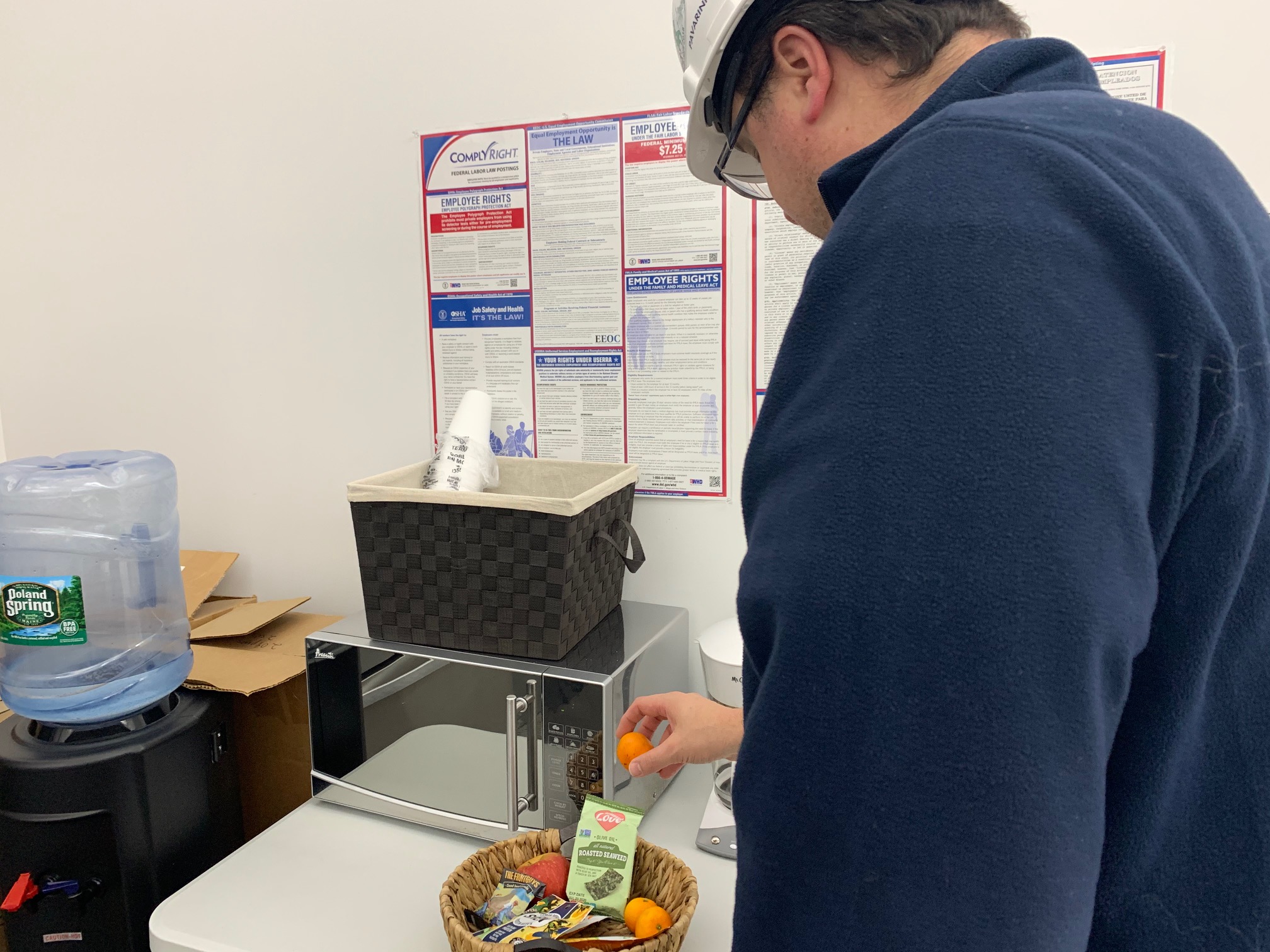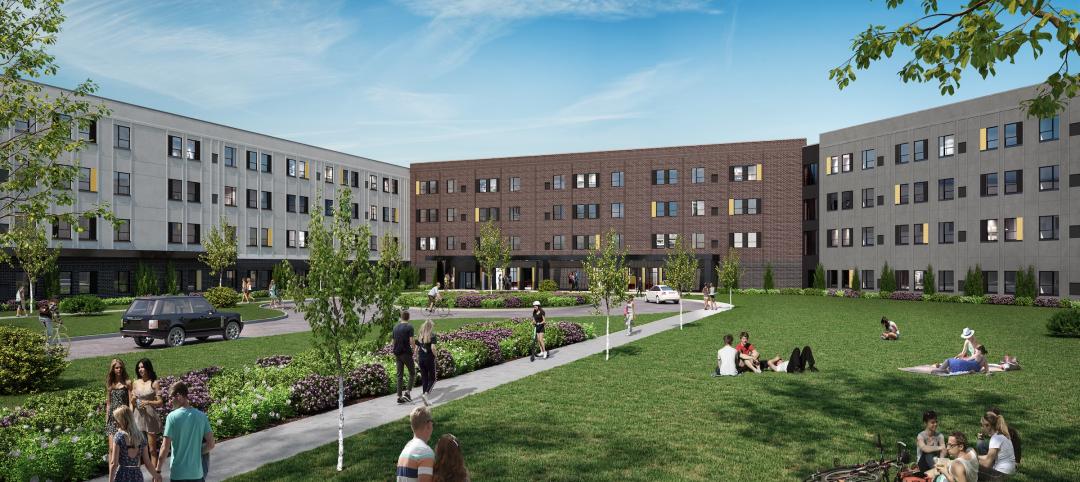Construction work is demanding—both physically and mentally—and the likelihood of injury or disability is higher than other sectors. As an industry, we have done an excellent job at emphasizing and improving site safety so that everyone goes home safe every day. But what about going home healthy?
While formal regulations, planning, and union collective bargaining agreements have helped address many health and safety risks, more holistic health and wellness issues, such as dehydration, weight management, poor air quality, and stress, are less commonly addressed.
New research on wellness in the construction sector highlights interventions that could be effective in addressing these issues.
1. Hydration stations. Dehydration can cause cognitive impairment and acute illness, and is linked with long-term health consequences like kidney stones and bladder cancer. Convenient, visible access to water is often considered the first step in addressing worker dehydration. In fact, many municipal and state laws require construction companies to supply water on their jobsites. Structure Tone’s Boston office not only supplies water to its jobsites, but goes one step further by delivering it from a hard-plumbed water source, which reduces the chance for contamination associated with a standard, five-gallon jug water dispenser system.
2. Access to healthy food. The prevalence of overweight employees within the construction industry is significantly higher than the general adult population. This has obvious health implications, but also business implications. Obesity can increase the risk of workplace disability, as well as decrease work ability and performance. Leading construction companies are addressing this issue head on. Turner Construction, for example, has implemented “wellness trailers” equipped to not only handle immediate medical responses, but also to help address chronic health issues such as obesity and Type 2 diabetes by providing healthy food and educational resources. Similarly, BCCI Construction recognizes the limitations of food storage on jobsites and has started providing food and beverages that are low in sugar and high in protein.
3. Space and tools for mindfulness. Workplace stress is linked to depression, anxiety, and even suicide. Empirical research on mindfulness in the construction sector supports the proposition that it could be beneficial to workers. Lendlease, for example, has recognized the importance of integrating mental health into its culture. Acknowledging that construction employees are more likely to experience high levels of stress, anxiety, and depression, they introduced Wellbeing Leave in 2015, which gives all employees one day every four months to address any health and wellbeing needs. Almost 70% of Lendlease’s employees used their Wellbeing Leave in 2018.
4. Improved air quality. Many construction companies use air quality monitoring and mitigation efforts such as water trucks, wind break installation, and stockpile coverings to manage air quality. Innovative companies, such as Pepper Construction, are going a step above by also addressing air quality within site trailers. Pepper’s trailers include such features as low-VOC/Greenguard Gold-certified acoustical panels and sheetrock, green cleaning supplies, walk-off mats, and operable windows that can provide fresh air.
Wellness in construction: The WELL Building Standard
Wellness features like these on construction sites aren’t just a minor workplace perk but a competitive advantage. Occupational injuries and illnesses cost the global economy over $1.25 trillion, with a disproportionately high rate of recorded accidents in the construction industry. Physically healthier, more mindful employees may be a key component to addressing this issue.
Luckily, construction organizations don’t have to start from scratch. Many of the wellness features outlined in the WELL Building Standard, such as those relating to the mind, nourishment, water, air, and physical activity, can be implemented outside of the typical corporate office on worksites and within construction trailers. Some forward-thinking construction companies like Structure Tone and BCCI have pursued WELL certification for their corporate offices to navigate and institute the associated behavioral changes before migrating those health and wellness opportunities to the jobsites.
BCCI has recently started surveying employees on jobsites to help identify the key impacts and strategize what wellness features to implement. What’s more, the Sustainability Construction Leaders group—sustainability leaders from national construction firms—and the resources behind the wellness building movement are ready to further help the industry integrate healthy workplace practices for construction workers.
About the Authors
Stephanie Timm, PhD, Senior Director, Delos; Whitney Austin Gray, PhD, Senior Vice President, Delos; Kena David, Director of Sustainability, BCCI Construction; Halie Colbourne, Sustainability Associate, BCCI Construction; Jennifer Taranto, Director of Sustainability, Structure Tone
Related Stories
Student Housing | Jun 25, 2024
P3 student housing project with 176 units slated for Purdue University Fort Wayne
A public/private partnership will fund a four-story, 213,000 sf apartment complex on Purdue University Fort Wayne’s (PFW’s) North Campus in Fort Wayne, Indiana. The P3 entity was formed exclusively for this property.
Sustainability | Jun 24, 2024
CBRE to use Climate X platform to help clients calculate climate-related risks
CBRE will use risk analysis platform Climate X to provide climate risk data to commercial renters and property owners. The agreement will help clients calculate climate-related risks and return on investments for retrofits or acquisitions that can boost resiliency.
MFPRO+ News | Jun 24, 2024
‘Yes in God’s Backyard’ movement could create more affordable housing
The so-called “Yes in God’s Backyard” (YIGBY) movement, where houses of worship convert their properties to housing, could help alleviate the serious housing crisis affecting many communities around the country.
Student Housing | Jun 20, 2024
How student housing developments are evolving to meet new expectations
The days of uninspired dorm rooms with little more than a bed and a communal bathroom down the hall are long gone. Students increasingly seek inclusive design, communities to enhance learning and living, and a focus on wellness that encompasses everything from meditation spaces to mental health resources.
Museums | Jun 20, 2024
Connecticut’s Bruce Museum more than doubles its size with a 42,000-sf, three-floor addition
In Greenwich, Conn., the Bruce Museum, a multidisciplinary institution highlighting art, science, and history, has undergone a campus revitalization and expansion that more than doubles the museum’s size. Designed by EskewDumezRipple and built by Turner Construction, the project includes a 42,000-sf, three-floor addition as well as a comprehensive renovation of the 32,500-sf museum, which was originally built as a private home in the mid-19th century and expanded in the early 1990s.
Building Technology | Jun 18, 2024
Could ‘smart’ building facades heat and cool buildings?
A promising research project looks at the possibilities for thermoelectric systems to thermally condition buildings, writes Mahsa Farid Mohajer, Sustainable Building Analyst with Stantec.
University Buildings | Jun 18, 2024
UC Riverside’s new School of Medicine building supports team-based learning, showcases passive design strategies
The University of California, Riverside, School of Medicine has opened the 94,576-sf, five-floor Education Building II (EDII). Created by the design-build team of CO Architects and Hensel Phelps, the medical school’s new home supports team-based student learning, offers social spaces, and provides departmental offices for faculty and staff.
Mass Timber | Jun 17, 2024
British Columbia hospital features mass timber community hall
The Cowichan District Hospital Replacement Project in Duncan, British Columbia, features an expansive community hall featuring mass timber construction. The hall, designed to promote social interaction and connection to give patients, families, and staff a warm and welcoming environment, connects a Diagnostic and Treatment (“D&T”) Block and Inpatient Tower.
Codes | Jun 17, 2024
To avoid lawsuits, contractors and designers need to do more than comply with codes
Climate change is making design and construction more challenging and increasing the potential for lawsuits against building teams, according to insurance experts. Building to code is not enough to reduce liability because codes have not kept up with the rapid climate changes that are making extreme weather more common.
Concrete Technology | Jun 17, 2024
MIT researchers are working on a way to use concrete as an electric battery
Researchers at MIT have developed a concrete mixture that can store electrical energy. The researchers say the mixture of water, cement, and carbon black could be used for building foundations and street paving.

















